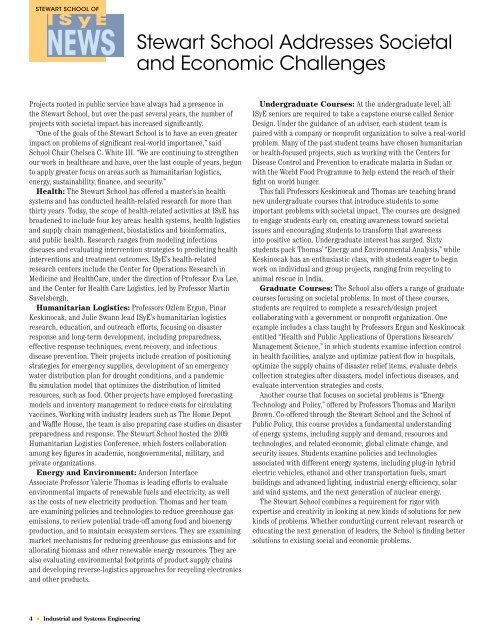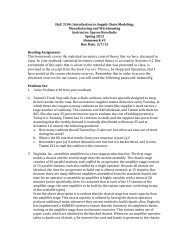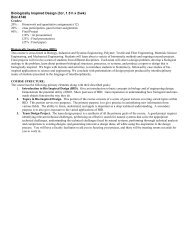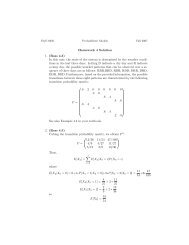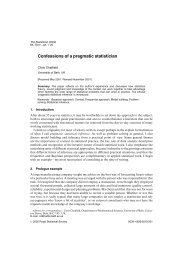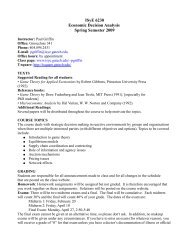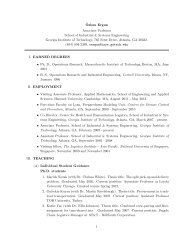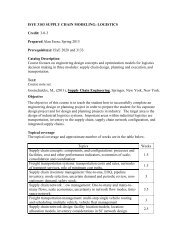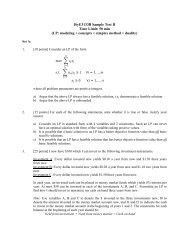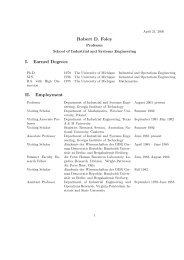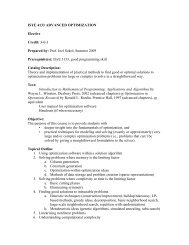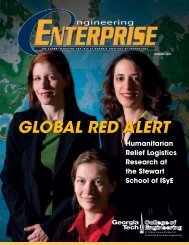Fall 2009 - H. Milton Stewart School of Industrial & Systems ...
Fall 2009 - H. Milton Stewart School of Industrial & Systems ...
Fall 2009 - H. Milton Stewart School of Industrial & Systems ...
Create successful ePaper yourself
Turn your PDF publications into a flip-book with our unique Google optimized e-Paper software.
I S y E<br />
STEWART SCHOOL OF<br />
NEWS<br />
<strong>Stewart</strong> <strong>School</strong> Addresses Societal<br />
and Economic Challenges<br />
Projects rooted in public service have always had a presence in<br />
the <strong>Stewart</strong> <strong>School</strong>, but over the past several years, the number <strong>of</strong><br />
projects with societal impact has increased significantly.<br />
“One <strong>of</strong> the goals <strong>of</strong> the <strong>Stewart</strong> <strong>School</strong> is to have an even greater<br />
impact on problems <strong>of</strong> significant real-world importance,” said<br />
<strong>School</strong> Chair Chelsea C. White III. “We are continuing to strengthen<br />
our work in healthcare and have, over the last couple <strong>of</strong> years, begun<br />
to apply greater focus on areas such as humanitarian logistics,<br />
energy, sustainability, finance, and security.”<br />
Health: The <strong>Stewart</strong> <strong>School</strong> has <strong>of</strong>fered a master’s in health<br />
systems and has conducted health-related research for more than<br />
thirty years. Today, the scope <strong>of</strong> health-related activities at ISyE has<br />
broadened to include four key areas: health systems, health logistics<br />
and supply chain management, biostatistics and bioinformatics,<br />
and public health. Research ranges from modeling infectious<br />
diseases and evaluating intervention strategies to predicting health<br />
interventions and treatment outcomes. ISyE’s health-related<br />
research centers include the Center for Operations Research in<br />
Medicine and HealthCare, under the direction <strong>of</strong> Pr<strong>of</strong>essor Eva Lee,<br />
and the Center for Health Care Logistics, led by Pr<strong>of</strong>essor Martin<br />
Savelsbergh.<br />
Humanitarian Logistics: Pr<strong>of</strong>essors Ozlem Ergun, Pinar<br />
Keskinocak, and Julie Swann lead ISyE’s humanitarian logistics<br />
research, education, and outreach efforts, focusing on disaster<br />
response and long-term development, including preparedness,<br />
effective response techniques, event recovery, and infectious<br />
disease prevention. Their projects include creation <strong>of</strong> positioning<br />
strategies for emergency supplies, development <strong>of</strong> an emergency<br />
water distribution plan for drought conditions, and a pandemic<br />
flu simulation model that optimizes the distribution <strong>of</strong> limited<br />
resources, such as food. Other projects have employed forecasting<br />
models and inventory management to reduce costs for circulating<br />
vaccines. Working with industry leaders such as The Home Depot<br />
and Waffle House, the team is also preparing case studies on disaster<br />
preparedness and response. The <strong>Stewart</strong> <strong>School</strong> hosted the <strong>2009</strong><br />
Humanitarian Logistics Conference, which fosters collaboration<br />
among key figures in academic, nongovernmental, military, and<br />
private organizations.<br />
Energy and Environment: Anderson Interface<br />
Associate Pr<strong>of</strong>essor Valerie Thomas is leading efforts to evaluate<br />
environmental impacts <strong>of</strong> renewable fuels and electricity, as well<br />
as the costs <strong>of</strong> new electricity production. Thomas and her team<br />
are examining policies and technologies to reduce greenhouse gas<br />
emissions, to review potential trade-<strong>of</strong>f among food and bioenergy<br />
production, and to maintain ecosystem services. They are examining<br />
market mechanisms for reducing greenhouse gas emissions and for<br />
allocating biomass and other renewable energy resources. They are<br />
also evaluating environmental footprints <strong>of</strong> product supply chains<br />
and developing reverse-logistics approaches for recycling electronics<br />
and other products.<br />
Undergraduate Courses: At the undergraduate level, all<br />
ISyE seniors are required to take a capstone course called Senior<br />
Design. Under the guidance <strong>of</strong> an adviser, each student team is<br />
paired with a company or nonpr<strong>of</strong>it organization to solve a real-world<br />
problem. Many <strong>of</strong> the past student teams have chosen humanitarian<br />
or health-focused projects, such as working with the Centers for<br />
Disease Control and Prevention to eradicate malaria in Sudan or<br />
with the World Food Programme to help extend the reach <strong>of</strong> their<br />
fight on world hunger.<br />
This fall Pr<strong>of</strong>essors Keskinocak and Thomas are teaching brand<br />
new undergraduate courses that introduce students to some<br />
important problems with societal impact. The courses are designed<br />
to engage students early on, creating awareness toward societal<br />
issues and encouraging students to transform that awareness<br />
into positive action. Undergraduate interest has surged. Sixty<br />
students pack Thomas’ “Energy and Environmental Analysis,” while<br />
Keskinocak has an enthusiastic class, with students eager to begin<br />
work on individual and group projects, ranging from recycling to<br />
animal rescue in India.<br />
Graduate Courses: The <strong>School</strong> also <strong>of</strong>fers a range <strong>of</strong> graduate<br />
courses focusing on societal problems. In most <strong>of</strong> these courses,<br />
students are required to complete a research/design project<br />
collaborating with a government or nonpr<strong>of</strong>it organization. One<br />
example includes a class taught by Pr<strong>of</strong>essors Ergun and Keskinocak<br />
entitled “Health and Public Applications <strong>of</strong> Operations Research/<br />
Management Science,” in which students examine infection control<br />
in health facilities, analyze and optimize patient flow in hospitals,<br />
optimize the supply chains <strong>of</strong> disaster relief items, evaluate debris<br />
collection strategies after disasters, model infectious diseases, and<br />
evaluate intervention strategies and costs.<br />
Another course that focuses on societal problems is “Energy<br />
Technology and Policy,” <strong>of</strong>fered by Pr<strong>of</strong>essors Thomas and Marilyn<br />
Brown. Co-<strong>of</strong>fered through the <strong>Stewart</strong> <strong>School</strong> and the <strong>School</strong> <strong>of</strong><br />
Public Policy, this course provides a fundamental understanding<br />
<strong>of</strong> energy systems, including supply and demand, resources and<br />
technologies, and related economic, global climate change, and<br />
security issues. Students examine policies and technologies<br />
associated with different energy systems, including plug-in hybrid<br />
electric vehicles, ethanol and other transportation fuels, smart<br />
buildings and advanced lighting, industrial energy efficiency, solar<br />
and wind systems, and the next generation <strong>of</strong> nuclear energy.<br />
The <strong>Stewart</strong> <strong>School</strong> combines a requirement for rigor with<br />
expertise and creativity in looking at new kinds <strong>of</strong> solutions for new<br />
kinds <strong>of</strong> problems. Whether conducting current relevant research or<br />
educating the next generation <strong>of</strong> leaders, the <strong>School</strong> is finding better<br />
solutions to existing social and economic problems.<br />
4 • <strong>Industrial</strong> and <strong>Systems</strong> Engineering


